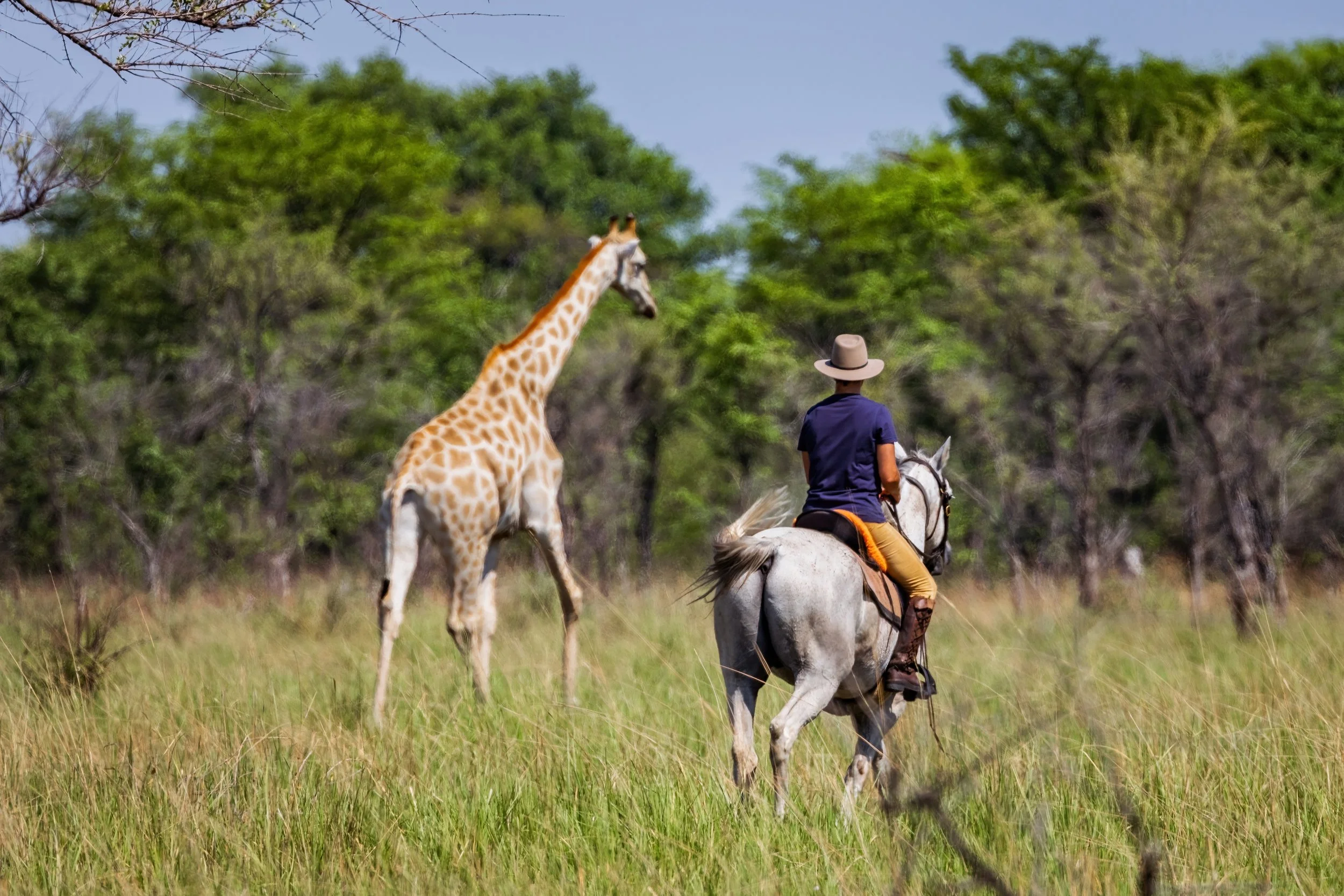
A riding journey in one of Zambia’s remote wilderness destinations, accessible only on horseback
Set amidst the untouched Zambezi floodplains, the experience is steeped in authenticity. Ride across vast, predator-free wilderness, spotting diverse wildlife and reveling in the silence of unspoiled nature. Begin your adventure with a stunning boat journey on the mighty Zambezi River, teeming with birdlife, hippos, crocodiles, and elephants—an awe-inspiring prelude to the treasures that await.
We offer a straightforward rate structure, starting with a 3-night horse safari. For those looking to extend their adventure, you can choose to stay at our home base, Chundukwa River Lodge in Livingstone, and explore the awe-inspiring Victoria Falls at your leisure.
Beyond the saddle, Zambian Horseback Safaris is a story of purpose-driven travel. Every journey supports local communities and contributes to vital conservation initiatives, ensuring the protection of wildlife and the preservation of this unique ecosystem for future generations.
Here, the spirit of exploration is rekindled, blending luxury, sustainability, and the timeless allure of Africa’s wilderness.
Rider Requirements for Our Horse Safari
To fully enjoy this incredible experience, you need to be fit, confident, and competent in the saddle. Our safari is best suited for intermediate plus to advanced riders. It is essential that you ride regularly and have the fitness and skill to comfortably manage a responsive, energetic horse at all paces — including a gallop — in open terrain. This ensures both your safety and the well-being of the horses, so please make sure you feel confident controlling a fit horse outdoors. Our Riding Policy
Flexible Group Options
If our horse safari camp is booked on an exclusive-use basis, we are happy to accommodate groups with mixed riding abilities, ensuring everyone has a memorable experience tailored to their comfort and skill levels.

FEEL THE SPIRIT OF THE SIMALAHA!
A stay at Zambian Horseback Safaris allows for pure riding freedom over ancient floodplains without holes - providing the space for long stretches of fast-paced riding on well-schooled horses.
Here, where cars and roads are non-existent, you'll traverse 180,000 hectares of pristine Zambezi floodplains, untouched by mass tourism.
Whether you’re a Western or English rider, our well-schooled horses promise open, exhilarating rides in a predator-free environment. Spot up to 21 species of wildlife, all while surrounded by breathtaking landscapes.
Your journey doesn’t start in the saddle - reach us in a stunning two-hour boat ride up the mighty Zambezi River, Africa’s fourth-largest river and look out for a plethora of birdlife, hippo, crocodile and elephant along the way.
By choosing this adventure, you’re not just creating memories; you’re contributing to the development of local communities and wildlife conservation.
Key Details:
Exclusively for experienced riders (other levels welcome with private camp use)
Bring along non-riding friends or partners—there’s something for everyone
Intimate group sizes, limited to just 8 riders

FEATURED IN: 
wildlife in the simalaha
The Simalaha Conservancy forms part of the Kavango Zambezi Transfrontier Conservation Area
Simalaha means “come together” and is the brainchild of the late Chief Inyambo Yeta.
In 2013, supported by Peace Parks, a wildlife sanctuary measuring 180,000 ha was established, forming the Simalaha Wildlife & Community Conservancy. More than 2000 animals have been rewilded here, including the endemic red lechwe. You can expect to see 22 species of wildlife on the plains. This does not include big predators such as lion and leopard. Because there are no predators, riders can enjoy the freedom by spreading out and not having to ride single-file.

getting here is part of the adventure!
Embark on an immersive journey in a beautiful and remote part of Zambia as we navigate upstream along the Zambezi River towards the Simalaha Wildlife Conservancy. Photographers will be spoilt for choice with a plethora of river and birdlife, including hippos, crocodiles and, at times, large elephant herds making their way along ancient migration routes. Guests will have a privileged insight into vibrant Lozi villages nestled on the riverbanks - and bear witness to fishermen skillfully employing traditional hand-woven nets from mokoros, with long-horned cattle grazing peacefully alongside wildlife. Later, riders will meet host Doug Evans and our horses further upstream, saddled and ready to ride!

YOUR STAY has a direct impact on the simalaha community
The Simalaha Wildlife Conservancy in Zambia was established with the vision of fostering a peaceful coexistence between local communities and wildlife.
Home to the Lozi people, who are renowned for their cattle herding traditions, the conservancy is a unique landscape where Lozi cattle - also known as Barotse cattle, one of Zambia’s four indigenous breeds - graze alongside wildlife.
What makes it all so special is the fact that it is a community-driven approach. Managed and supported by the local Lozi community, it focuses on sustainable resource management and wildlife protection, ensuring that both people and nature thrive together.
We are the sole tourism operator in the Simalaha Wildlife Conservancy and when you ride with us - you make a direct contribution to the Conservancy Trust - empowering and supporting this incredible community initiative. Thank you for supporting Responsible Tourism!










